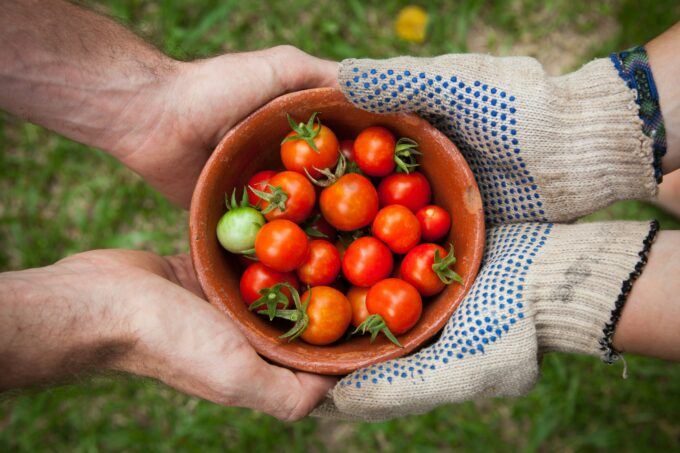
Image by Elaine Casap.
Throughout the world, parents will/can be heard urging their children to share — their food, their toys, their things — with siblings and friends.
For the most part, toddlers share gladly, offering what they have without hesitation. But once they enter school, this natural inclination is absorbed into the developing sense of individuality, as the notion of “me and mine” takes root.
Part of that structure is the notion of separation: the idea that we are separate – from one another, from the natural world, and from that impelling force some might call God. This belief in separation, known in some traditions as the Great Illusion, creates the ground for suspicion and feeds one of the most divisive of human tendencies — competition.
We are conditioned to compete virtually from birth, and competition, driven by the pursuit of success and the lure of reward, becomes a major force in the shift away from sharing toward selfishness and personal gain — leading, all too often, to insatiable greed.
This gives rise to one of mankind’s most corrosive traits: complacency, underpinning ills from genocide in Palestine to environmental collapse and grinding poverty wherever it exists.
A World Without Sharing
Poverty remains the single greatest cause of premature death in the world — poverty that could be eradicated if sharing were the guiding principle of our socio-economic system.
The United Nations estimates that 808 million people worldwide are living in extreme poverty, defined as earning less than $3.00 per day. This represents approximately 9.9% of the global population — about 1 in 10 people.
The majority of those affected are in former colonial countries in sub-Saharan Africa. Of this staggering total, 330 million are children, many of whom will die young, victims of human indifference and systemic brutality.
In our perverted world, there are rich countries and poor countries, and these 330 million children happened to be born into poor families living in poor countries, many of which have been exploited and subjugated for generations by imperial powers.
Yet the world is rich — overflowing with food, water, and other natural resources, providing all that humans need to flourish, not merely survive. But one in ten people living on this Earth do not flourish. They struggle every day to feed themselves and simply survive.
Almost everyone born poor remains poor, wherever they live; poverty brings suffering, exclusion, and marginalisation; access to life’s essentials — food, water, shelter, healthcare, and education is limited or denied, not because resources are scarce, but because distribution depends on the ability to pay, not on need.
It’s madness, isn’t it? We collectively allow millions of people to die, or to live unfulfilled lives of deprivation, simply because they are poor — while at the same time permitting vast wealth to accumulate in the hands of a tiny few, and celebrating, even championing, their “success.”
This obscenity is called inequality, and beneath the righteous rhetoric of politicians sits an unspoken, corrosive belief that poverty is partly self-inflicted — that the poor are poor because they lack “fight,” or determination. This is, of course, utter nonsense — a comforting falsehood that absolves the privileged and justifies the cruelty of systems built on exploitation and exclusion.
The poor — the forgotten and marginalized — live in degradation under an inhumane socio-economic order. A cruel, unjust structure maintained by imperial powers who, while professing to work to end poverty and reduce inequality, do everything possible to preserve the systemic violence condemning nearly a billion people to lives of crushing hardship.
While the Global North provides aid, far more wealth flows from the Global South to rich nations than the other way around. Much of this is driven by debt, as Development Finance International notes, “citizens of the Global South now face the worst debt crisis since global records began.”
All of this, the debt, the poverty, the needless death — is a direct consequence of a world rooted in division, devoid of sharing.
The results are plain to see: distrust, tension, and conflict; poverty, starvation, and needless death; social injustice and resentment; mental anguish and lives consumed by anxiety.
For the simple reason that humanity refuses to share — or more accurately, because those who have refuse to share: first with those who have nothing, then with those who have less.
Food and other resources are stored away — sometimes allowed to rot; wealth is hoarded; knowledge and skills are withheld. Land, the common ground beneath us all, is fenced off, not shared. Consider Gaza, where ongoing genocide might have been prevented if the territory between the Jordan River and the Mediterranean had been shared by Israel with Palestinians.
Healthcare, technology, education, political influence, and security are concentrated in the hands of the powerful, while the majority are excluded. This colossal selfishness shapes the systems we live under, embeds injustice at every level and perpetuates poverty, suffering, and war.
A World Rooted in Sharing
The introduction of sharing as a guiding principle could change all of this — and more. “Share and change the world,” someone once said. It may sound simple, yet it is true; share and create peace through justice: there will never be peace without social justice, and justice is impossible without sharing.
Every area of life would benefit — from healthcare and education to culture, science, technology, and the environment: first in areas of greatest deprivation — the Global South, then in middle-income countries, and finally in neglected parts of wealthy nations.
But the areas where sharing would have the greatest impact are the socio-economic system and governance. These two interconnected domains dominate the lives of everyone; almost everything flows from them.
Like wealth, political power is concentrated in the hands of a few, with politicians/leaders largely insulated from real life and the needs of the majority. Sharing would revolutionise governance — allowing true democracy to flourish.
Direct democracy — facilitated through participatory bodies such as citizens’ assemblies and councils, would give citizens a genuine voice and the means to exercise their rights, enabling policies to be shaped by collective reasoning rather than by suited autocrats driven by ideology and self-interest. Sharing — distributing power away from the centre — would increase accountability, foster trust, and cultivate participation and social responsibility.
Now imagine a socio-economic system rooted in The Principle of Sharing — its central purpose not the generation of profit for capital, but the meeting of human need.
The first step would be to assess that need — and it is vast. A global aid and reconstruction programme, akin to the post–Second World War Marshall Plan, would be required to begin rebuilding societies ravaged by poverty, conflict, and neglect.
Natural resources would be distributed based on need, not the ability to pay. Nations would cooperate, sharing their surplus with those that lack essential commodities. A Global Commons, managed through sophisticated exchange mechanisms, could ensure fair access to food, water, energy, and materials for all.
Such a model would dramatically reduce poverty, hunger, and systemic injustice. It would give humanity the space to breathe, to create, and to live dignified lives free from fear and want.
Sharing as the change
The very idea of such a dramatic shift may sound idealistic, even fanciful. Yet if we truly want peace, an end to poverty and hunger, and the restoration of the natural world — as most of us do — then nothing less than a seismic transformation of our systems is required.
But systemic change cannot occur without a corresponding shift in consciousness — one rooted in the recognition of our essential unity. I suggest that this shift is already underway. Despite the present chaos, new expressions of cooperation and sharing are emerging everywhere: within communities, between neighbours, and through grassroots movements.
At its core, humanity is generous and kind; the systems we live under, however, are cruel — barbaric even — designed to inflame desire and anger, divide communities, concentrate power and wealth, and perpetuate poverty and conflict.
This monolithic structure, outdated, violent and unjust, must be toppled, and sharing is the force that could bring it crashing down.
When and if humanity embraces sharing as the guiding principle of human affairs, the practical details will follow: new tax systems, fairer mechanisms of exchange, and new forms of governance. The reimagining of civilisation would allow new modes of living to emerge — grounded in perennial principles of goodness, cooperation, tolerance, understanding, and unity. And in learning to share, the veil of separation would at last be lifted, allowing humanity to see itself anew, as brothers and sisters of one humanity.
The post Is Sharing The Answer? appeared first on CounterPunch.org.
From CounterPunch.org via this RSS feed


